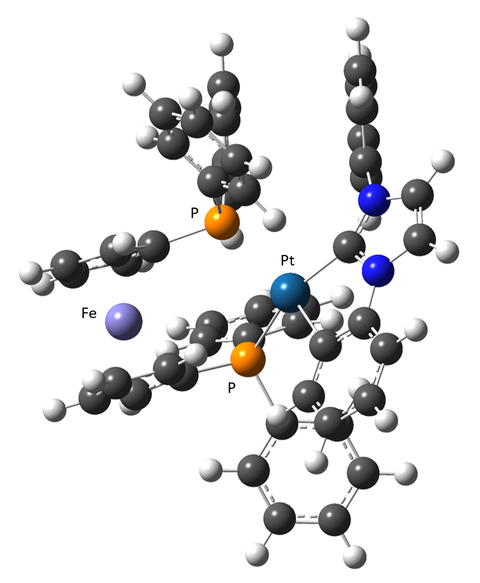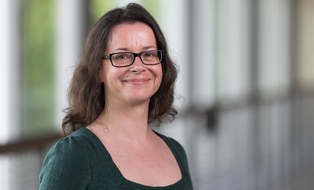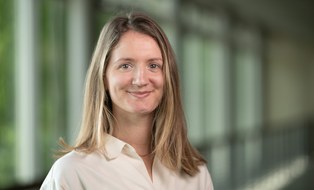Prof. Dr. Thomas Straßner: New Precious Metal NHC Complexes
Applicant: Prof. Dr. Thomas Strassner, Chair of Physical Organic Chemistry, Faculty of Chemistry and Food Chemistry |School of Science
Period: 2020 - 2022
Participating partners: Charles University, Prague, Czech Republic
The funded project, "New Gold-NHC Complexes," is an example of a successful international cooperation. It is based on the long-standing collaboration between Prof. Dr. Thomas Straßner's working group at TU Dresden and RNDr. Petr Stepnička of the Faculty of Natural Sciences at Charles University in Prague.
As part of the project, precious metal compounds with cyclometallated ligands were investigated for their electrochemical and photophysical (interactions with light) properties.

Precious metal complex
Both working groups contribute their expertise to the research field. The Prague group has extensive experience in structural and electrochemistry, while the Dresden group contributes expertise in investigating and analyzing photophysical properties using quantum chemical calculations. Additionally, TU Dresden was among the first to produce cyclometallated platinum and ruthenium complexes with N-heterocyclic carbene ligands. This complements the Prague group's expertise in metallocene derivatives and gold complexes.
"In the project, the team members learned a lot from each other through the intensive exchange," reports Prof. Dr. Straßner. In addition to joint publications*, this productive collaboration is characterized by mutual coordination and supplementation of content. Both sides can learn a lot from each other and enrich each other professionally. Therefore, it is not surprising that the collaboration has intensified over the years. There is a lively exchange between Czech and German scientists, e.g. in the form of research stays and mutual visits. Prof. Straßner's research group hosted another guest scientist in 2025.
Former doctoral students from Charles University who were guests at TU Dresden and now work in responsible positions are important multipliers in fostering the exchange. Meanwhile, the collaboration has evolved into a network extending beyond Prague.
"It's important to understand different perspectives and approaches, to gain new insights, and to see things from a different point of view," comments Prof. Dr. Thomas Straßner regarding the relevance of internationalization. For him, this approach plays a key role in developing new ideas.
The intensive collaboration between the two working groups is an example of a successful research cooperation with a strategically important partner university in the border triangle of Saxony, the Czech Republic and Poland. Their close professional complementarity and productive scientific exchange enabled them to maximize synergies and resulted in four publications in renowned journals. This collaboration demonstrates how long-term scientific partnerships across national borders can promote innovative research and increase international visibility.
*Z. Leitner, F. Wurl, J. Schulz, I. Cisarova, T. Strassner, P. Stepnicka, 'Synthesis and bonding in platinum(II) complexes with cyclometalated carbene and isoelectronic bis(phosphino)metallocene ligands', J. Organomet. Chem. 1015, 123236 (2024).
F. Horký, J. Soellner, J. Schulz, I. Císařová, T. Strassner, P. Štěpnička, 'Synthesis of Pt(II) phosphinocarboxylate complexes with auxiliary arylcarbene ligands and factors that control their stereochemistry', New J. Chem., 47(39), 18442-18449 (2023).
O. Barta, P. Pinter, I. Ciserova, T. Strassner, P. Stepnicka, 'Synthesis and Characterization of Cationic Platinum(II) Complexes with Two Chelating Ligands', Eur. J. Inorg. Chem., 575-580 (2020).
M. Zábranský, J. Soellner, F. Horký, I. Císařová, P. Štěpnička*, T. Strassner*, 'Synthesis and Characterization of Cyclometalated NHC Platinum Complexes with Chelating Carboxylate Ligands', Eur. J. Inorg. Chem., 2284-2290 (2019).
Contact
 © Sven Ellger/TUD
© Sven Ellger/TUD
Coordinator
NameDaniela Mohrich
International Funding Programmes
Send encrypted email via the SecureMail portal (for TUD external users only).
International Office
International Office
Visiting address:
Fritz Foerster Bau, Office 167 Mommsenstraße 6
01069 Dresden
Postal address:
TUD Dresden University of Technology International Office
01062 Dresden
 © Sven Ellger/TUD
© Sven Ellger/TUD
Research Assistant
NameHelene Herwig
Send encrypted email via the SecureMail portal (for TUD external users only).
International Office
International Office
Visiting address:
Fritz Foerster Bau, Office 167 Mommsenstraße 6
01069 Dresden
Postal address:
TUD Dresden University of Technology International Office
01062 Dresden
